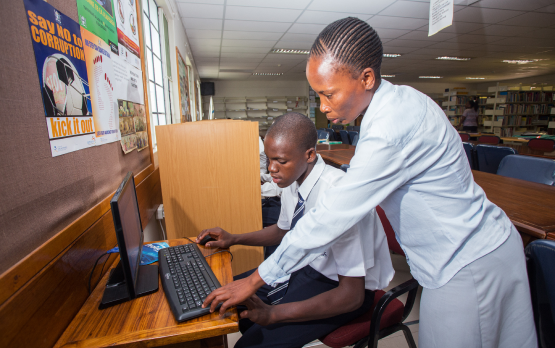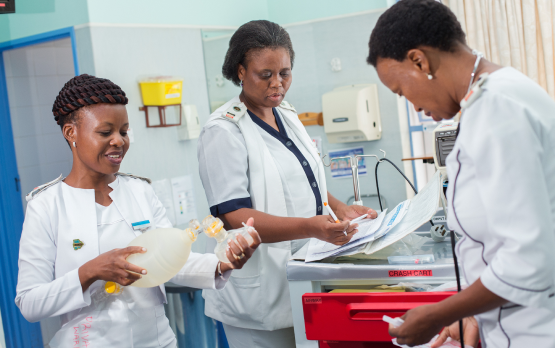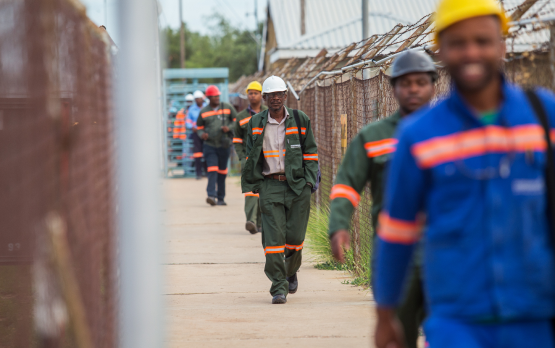Debswana has taken great care over the years to guarantee that the people of Botswana benefit from the mineral profits. In order to do this, the nation benefits from well-designed beneficiation programmes and initiatives, which have had a major positive influence on Batswana’s quality of life.
Structure: A private company owned 50-50 by Government of Botswana and De Beers Group
Mission: We mine diamonds safely, optimally, and responsibly
Vision: To be a global bench-mark diamond business
Purpose: Make Life Brilliant
Tons Moved: 122,675 Million
Tons Treated: 25,855 Million
Carats Recovered: 24,700 Million
Strategy 2024 Goal: P10 Billion of additional value to the business by end of 2024
Employees: 5, 010
Debswana Diamond Company operates four diamond mines in Orapa, Letlhakane, Damtshaa and Jwaneng, and is a major contributor to the national economy of Botswana. The company, established in 1969, is an equal-share joint venture between the Government of Botswana and De Beers Group.
The first diamond deposits were discovered in Orapa in 1967 before mining commenced in 1971. With prudent management and foresight, the Orapa mine operation provided revenue that saw the birth of the other Debswana mines, whose diamonds were discovered in Letlhakane in 1968, Damtshaa in 1970 and Jwaneng in 1972.
The company has played an active role in the growth and development of Botswana. Through diamond revenues, Botswana’s fortunes have turned from being one of the ten poorest countries in the world in 1966 to becoming an upper middle-income economy; from GDP per capita of USD70 in 1966 to USD7738 in 2022 (World Bank); and from being a breadbasket in 1967 to the highest investment sovereign credit rating in Sub-Saharan Africa at an “BBB+” rating in 2024. Botswana only had 12kms of tarred road in 1967. Currently, there is over 32000 kilometres of well-tarred road network, with links that foster travel to and with almost every major destination in the region. Literacy rate was below 30% in 1967; now the country boasts a literacy rate of 90%. There we three (3) secondary schools in 1966; this figure has increased to 300 secondary schools as at the end of 2023. Beyond primary school, education is 95% funded by the Government; that is, every child receives free schooling to the age of 13; tertiary is also funded by Government should a child / leaner perform well at secondary school. Top achievers graduating from secondary school get full Government scholarships to the best universities in the world. The diamond industry contributes to more than 34,000 jobs both directly and indirectly, equivalent to one in every 20 jobs in the country.
The country has continued to transform and offers members of the public free access to health and basic education, due to diamond revenues. The country has been able to see growth in literacy and combat major health challenges that it has faced.
Debswana has over the past five decades implemented various programmes to address poverty, exclusion and inequality. When Debswana started mining in central Botswana in 1971 and a decade later in the south, there were no towns nor villages in the vicinity, except for cattle posts. Therefore, Debswana had to start from scratch in terms of developing social services and infrastructure. The company sourced labour from various areas of the country and the world; as such had to provide services for its employees. Over time the population around our mines grew and the company began to extend its services and other programmes to host communities and the country at large.
Debswana conducts its stakeholder-driven materiality assessment every two to three years to better understand how the business impacts communities and the environment. In March 2024, a third-party consultancy was commissioned to independently assist Debswana to identify Environmental, Social and Governance topics that impact its business, society and stakeholders. A double materiality was conducted, which is a robust dual approach which looks at much more broadly how the topic impacts our corporate value and how our business impacts the topic. The double materiality assessment is a key input of the annual Debswana Sustainability Report formerly known as Report to Stakeholders, which is published in compliance to the Global Reporting Initiative 2021 sustainability reporting standards.
The 19 material topics identified fall under the environment and social space. Many of the material issues are interconnected, aligned to Debswana ESG risks and the following emergent themes are observed;
The most material issue for Debswana both in terms of impact on business and on the environment and society is reducing greenhouse gas emissions and transitioning to renewable energy. Acting on these issues is key to addressing other highly material topics including climate resilience and adaptation. The second material issue is socio economic impacts on Botswana and communities. It is critical that Debswana focuses on its socio-economic impacts, both on the country and on local communities e.g. through local employment, entrepreneurship, benefit sharing, etc. Debswana is the largest private sector employer in the country and stakeholders expect the business to ensure the development of communities by contributing to social infrastructure (e.g. healthcare, education etc.), offering training and capability building opportunities, ensuring diversity and inclusion and mitigating health and safety impacts. Thirdly, diversity and inclusion links to business governance and is of high importance externally, especially in terms of gender equality.



In August 2017, Debswana along with other partners (Government, De Beers and Anglo American) officially signed a Memorandum of Understanding on the Tokafala Enterprise Development Programme. The Tokafala Enterprise Development Programme began as a pilot in January 2014 in an effort to capacitate Small, Micro and Medium sized business for increased economic growth and reduced unemployment.
Want to read to our news letters, follow the button below.

Powered by Debswana © 2024